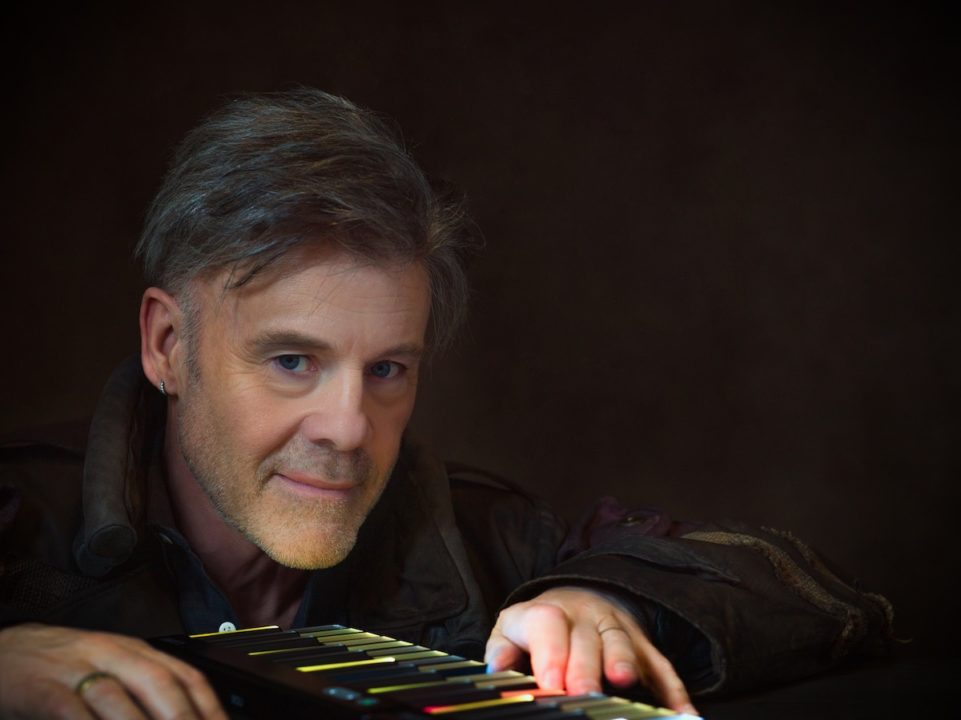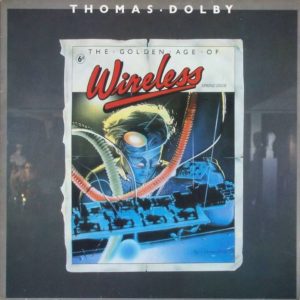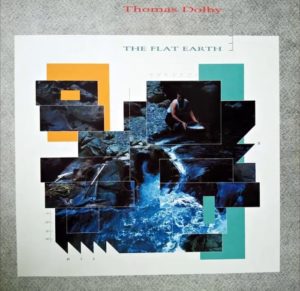
In the 80s Thomas Dolby was the mad professor of synth, now turned actual professor. Classic Pop joins one of music’s most cerebral artists to talk academia, AI, musical resurrections and novels…
Pop star, record producer, film composer, tech entrepreneur, author, academic, filmmaker… few people embody the phrase ‘renaissance man’ more than Thomas Dolby. In the last 10 years alone, he has put out a best-selling memoir (2016’s The Speed Of Sound: Breaking The Barriers Between Music And Technology), joined the famed Johns Hopkins University as lecturer and written his first novel.
“I’ve just really enjoyed teaching these past few years,” Dolby tells Classic Pop from his home in Baltimore. “I left school at 16 but I’m from a long line of Oxford and Cambridge professors. Only the other day someone said to me I’d finally joined the family firm!”
So what, we ask, does the composer of She Blinded Me With Science and Hyperactive! put as his profession on official forms these days? For a committed polymath like Dolby, it could be anything. “Well, if you put ‘musician’ the premium will go up,” he laughs. “Whereas with ‘teacher’ or ‘educator’ you might get a discount, so I tend to do that these days. But not all pull-down menus have ‘Professor’ in them, which is very annoying when you’re trying to get a good table at a restaurant.”
Academic Artist
That the pop maverick known as Thomas Dolby (real name: Thomas Morgan Robertson) ended up in academia isn’t such a great surprise, as there was always something quite scholarly about him. Whereas many of his chart peers were circling themselves with leggy supermodels in their videos, there Dolby was – in the She Blinded Me With Science promo – sharing screen time with TV egghead Dr Magnus Pyke. Even the singer’s short-lived alias – Booker T Boffin – nodded towards his own slightly bookish air.
“I do a lot of things, but I don’t purport to be brilliant at all of them,” Dolby says, modestly. “But I do enjoy learning something new. My temptation is always to dig under the hood and see how the whole thing works.”

Restless Curiosity
It’s this kind of restless curiosity that led to Dolby forming a company, Headspace, in 1993, specialising in interactive audio technology, while for his last album, 2011’s A Map Of The Floating City, he built an online game that allowed people to explore the record’s songs and characters. It’s why, unlike so many of his generation, he’s welcoming of the opportunities developing technologies, such as AI, offer in terms of creating art.
“Often new technologies come along and make a lot of noise and people get paranoid,” he suggests. “Nobody knows what’s going to happen next, so they tend to look to tech leaders and politicians to tell them, but it’s actually artists who are the ones who step up and show what new technologies are for. That’s been true for centuries.
“So, with AI, it’s for the artist to dive in, risking tripping up and looking like complete idiots, to show what’s great about this new tech.”
“Conversely,” he continues, “if I spend time going back to something tried and tested, and it’s been thoroughly explored by others, I feel like I am wasting opportunities to work with new technologies.”

Totally Tubular
“I don’t play live very much these days,” he reflects on his Totally Tubular tour. “There’s a thin line between an artist that’s viewed as milking that retro thing versus somebody that’s still relevant and authentic. I’m fairly unique in the sense that I never broke up or have been in and out of rehab. With me, you know you’re getting the real McCoy. The question is whether it can spark an interest that would lead to me thinking, ‘Maybe it’s time to throw in the towel with the teaching and making some new music and getting back on the road.’
“When I look at some of my contemporaries, they appear to be residing in the ‘where are they now?’ files, then suddenly they’ll have this enormous comeback and enormous hit out of the blue – it’s fantastic when that happens. I look at Kate Bush, for example – what a phenomenal story that was with Stranger Things. Anybody would dream of having that wave of interest. That’s a motive to make new music and get back out there.
“For a lot of, let’s say, legacy artists,” he adds, “it’s intimidating, because you worry, maybe my best years are behind me, maybe I’m going to do something mediocre, and people are going to slag it off, saying, ‘It’s not 1982 anymore.’ But you have to forgive yourself for growing up, and forgive your audience for growing up and not wanting to get in your pants anymore. You have to be willing to take a deep breath and say, ‘Yeah, I’m going to do it anyway.’”
Orchestral Manoeuvres
Though Thomas Dolby is still awaiting a Stranger Things/Running Up That Hill moment, in the 80s and 90s his songs graced a number of films, including Howard The Duck, FernGully: The Last Rainforest and Toys. Not only that, but he was also hired as composer for a number of movies, including 1985 drama Fever Pitch and 1986’s Ken Russell-directed Gothic, a historical horror telling the story of Percy and Mary Shelley’s visit to Lord Byron in Villa Diodati by Lake Geneva in 1816.
“It’s my most comprehensive film score,” Dolby says, “but it wasn’t a great experience. It was eye-opening, because it was the first time I’d worked with an orchestra, which in this case was the London Symphony Orchestra – but unfortunately I was paying them! It’s a wonderful thing to hear an orchestra playing your music, but when you’re the one paying for the overtime, that’s not good news.
“A few other musicians have [moved into film scoring], people like Danny Elfman, Trent Reznor, Mark Mothersbaugh… They’ve been really successful crossing over, into a world that was quite stuffy. It’s less so now, but there used to be a feeling in the Hollywood film-scoring community that an untrained musician from the rock world doesn’t really know what they’re doing. In reality, some of the most exciting scores have been made by that route in the last 20-30 years, rather than the John Williams, Jerry Goldsmith-type community. I think now in Hollywood, it’s accepted. It’s like, you don’t have to be a conservatory-trained musician in order to be able to make good film scores.”

Dropping The Fourth Wall
The last time we spoke to Dolby, he described his fanbase as, “compared to the average… quite literate, thoughtful and articulate.”
“I tend to take people under the hood to unpack the songs,” he reveals about performing tracks in a live setting. “Sometimes I will loop-record them in and build on layers so that people can hear the individual components. And sometimes I’ll tell stories about the songs.”
When Dolby toured in 2014 he invited audience members to approach the stage and pick ping pong balls out of a hat, each of which had a different song title printed on them. He would then, “pick the songs to pieces, playing some of the individual parts and explaining how I recorded them”, bringing a little of that lecture hall learnedness to a pop gig.
“I think my audiences really appreciated dropping the fourth wall, and taking them on the inside,” he smiles. “As time goes on, people that have lived with this music for years become increasingly interested in the stories behind them. In those situations, I tend to go for the deeper cuts, songs like Screen Kiss, I Love You Goodbye, Airwaves and Oceanea, which were never the most played on the radio. They didn’t chart as singles, but they were the songs [the audience] got most fired up about and were most affectionate about. It’s not She Blinded Me With Science or Hyperactive!.
“I think my audience accepts that’s the commercial end of what I do and I’ve always got that element up my sleeve. I have fun with those more superficial, frilly songs, but mainly I see them as a springboard to get people into the deeper cuts.”

Attracted To The New
Despite a career stretching back to 1982, there are just five Thomas Dolby albums for the singer to pick from and academia has, for now, taken priority. “Every social media I post, regardless of the topic, there are going to be comments going, ‘When do we get a new album?’ and ‘When are you coming to Indianapolis?’ It’s as if you’re their property, and it’s like, ‘you owe us’. I can sort of understand that.
“I’ve always been attracted to the new, new thing, whether it was making MTV videos or starting a software company, or doing video games and interactive stuff, making a film or now teaching.”
Talking of new trades, the latest string to Dolby’s bow is fiction-writing. His first novel, a historical epic titled Prevailing Wind about the America’s Cup (he’s a keen sailor and is, he admits, “obsessed with classic yachts”), was released in this summer. “I’m so out of my depth as a writer,” he admits. “It’s not my number one medium. Yet that’s why it’s exciting to me, because it’s challenging. With music, I’ve kinda been there, done that.”
Stranger Things Have Happened…
So, does he ever think he’s done with creating music? He ponders the question. “Not to say I can’t get back there,” he says, “but if there’s something else that’s beckoning, where I have to learn new skills and find new ways to express myself, it’s always my inclination to go that way. I think people who follow what I do, they get that about me, despite the few that feel I’m their property.”
As regards a new album, well, that’s really up to the gods. Dolby admits it’s “not on the immediate horizon”, but who knows? If, for instance, one of his older numbers got a Running Up That Hill/Murder On The Dancefloor-style revival owing to its use in some blockbuster film or TV show, he admits he could be tempted back. But until a Stranger Things or a Saltburn exhumes a Dolby classic like Windpower or Field Work, he’s happy to teach, write, or do whatever new comes up.
“I don’t like blowing my own trumpet and getting up every day and having to make a splash about my own product,” he says, “but if there was an upsurge of demand and I heard that sucking sound, it would encourage me.”
So there you go. If any movie or TV directors are reading, you could do a lot worse than raid the Thomas Dolby discography for your next project. Because if any 80s star deserves a second coming in the 2020s, it is synth-pop’s nutty professor, blinding us with science one more time.
Thomas Dolby’s new novel Prevailing Wind is out now, click here
Read More: Thomas Dolby – Aliens Ate My Buick
The post Breaking the fourth wall with Thomas Dolby appeared first on Classic Pop Magazine.
